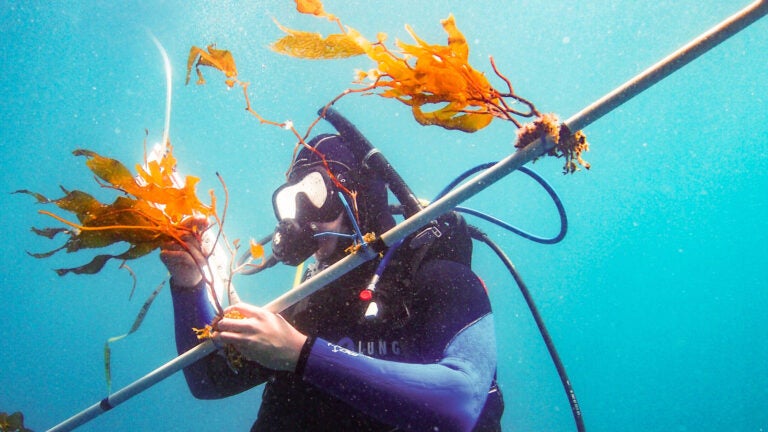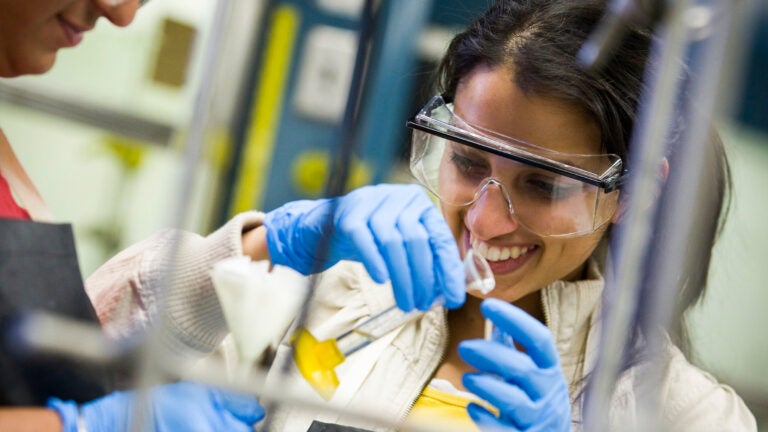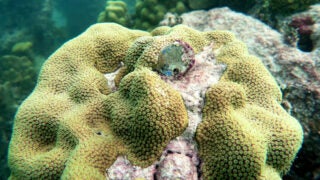Research
Climate change? We’re driving positive change.
At USC we’re pioneering new interdisciplinary research that pushes the boundaries of what’s possible. Our scholars are at the forefront of climate change mitigation, forging new pathways to a more sustainable future through groundbreaking discoveries. With more than 25 specialized programs, institutes and centers, we drive tangible advancements that lead to real-world action.
Sustainability Research News
Researchers in landscape architecture, fluid mechanics and augmented reality have created an interactive hydraulic model alongside the river.
A new study shows that plants use their circadian clocks to regulate responses to changes in water and salinity, offering a new avenue for creating drought-resistant crops.
People across all demographics could change their minds when they learned about the environmental benefits of seafood farming, USC research suggests.
USC Dornsife researchers studying a common Caribbean coral’s ability to adapt to rising temperatures turn up an unexpected result.
Growing USC’s Sustainability Research
USC researchers are actively engaged in advancing sustainability goals through groundbreaking efforts. Discover USC’s alignment with the United Nations Sustainable Development Goals and explore the impactful work of USC’s Center for Sustainability Solutions, which focuses on developing policy, technological and behavioral solutions for urgent challenges locally and globally. The center facilitates collaboration between scholars and stakeholders from sustainability organizations worldwide to conduct diverse research designed for tangible impact.
Expanding Sustainability Research
USC Sustainability Research Finder
Developing Solutions for Sustainability
Arts & Climate Collective
A joint effort with USC Arts in Action (a program under Visions and Voices), the USC Office of Sustainability and the USC Annenberg Innovation Lab, USC’s Arts & Climate Collective leverages research and real-world action to highlight the rich connections between sustainability and artistic or cultural endeavors.
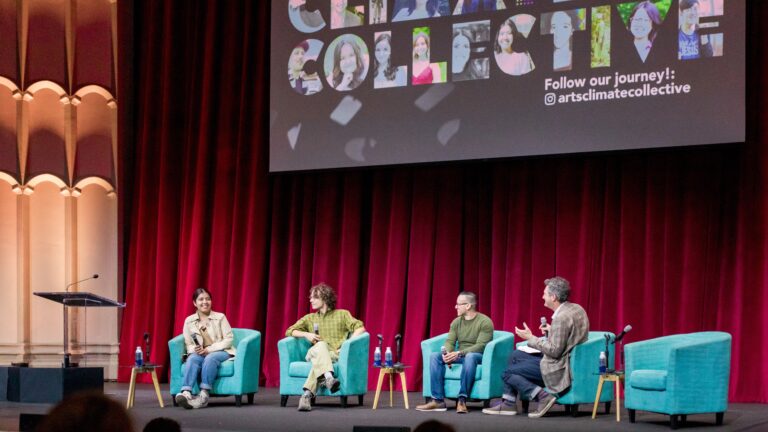
“I think the spirit of sustainability really depends on collaboration across disciplines.”
David Bañuelas, USC Presidential Sustainability Solutions Fellow
USC Presidential Sustainability Solutions Fellows
The five inaugural recipients of the two-year USC Presidential Sustainability Solutions Fellowship will pursue an inspiring array of research projects — from protecting salt marshes to promoting climate justice through video gaming and beyond. The appointments include cross-disciplinary USC faculty mentors, dedicated programming, a salary, support for relocation expenses, funding for research and a budget to hire student researchers.
Katherine Baker
As a public health researcher at the intersection of nutrition and climate change, Katherine Baker is investigating solutions for sustainable and equitable food systems.
David Bañuelas
Using an interdisciplinary approach through biology and engineering, David Bañuelas applies metagenomic data to predict sea level rise impacts across Southern California.
Matthew Coopilton
Through climate change-focused educational activities featuring play, game design, digital literacies and worldbuilding, Matthew Coopilton supports learners to imagine and create sustainable futures free from systemic oppression.
Zhongzheng “Jason” Niu
Epidemiologist Zhongzheng “Jason” Niu studies the effects of air pollution, heatwaves and other environmental exposures on cardiometabolic health risk and the biological aging process.
Anna Vinton
With cutting-edge quantitative tools and mathematical theory, Anna Vinton is discovering how natural populations such as coral reef can adapt, survive and avoid extinction due to environmental change.
President’s Sustainability Initiative Award
Integrating sustainability as a core value into USC’s strategic planning is critical to our institutional commitment. The President’s Sustainability Initiative Award empowers researchers to seek highly competitive federal funding, large center-related programs, early-career awards and individual research projects as a means to strengthen USC’s strengths and capabilities in sustainability.
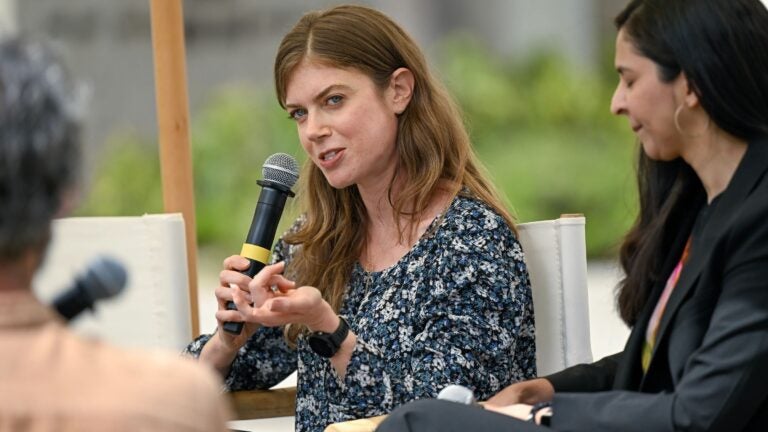
Achieving Significant Impact
USC’s research prowess through centers, institutes and programs addresses societal needs with scalable, replicable solutions geared toward a healthier future for all.
-
The AirPollBrain (APB) Group promotes optimal neurodevelopment and healthy brain aging by better understanding urban air pollution and gene-environment interactions. With a multidisciplinary approach, the APB Group connects USC leaders in urban environmental health research with collaborating institutions to address environmental effects across the life span.
-
USC Annenberg’s Center for Climate Journalism and Communication leverages the expertise of the school’s renowned journalism and communication faculty to train journalists, communication professionals and students to tackle the biggest story of our time.
-
The Arid Climates and Water Research Center addresses the severe deficiencies in characterizing, monitoring and understanding water scarcity in arid climates. The center establishes USC — the largest university in the largest water-scarce urban center in the world — as the leading university nationwide developing and designing new technologies and analytical tools to mitigate water scarcity, desertification and arid climatic variability.
-
CATT is the focal point for USC’s transportation research and performs high-impact research on urgent transportation issues in cooperation with industry and government. Using advanced technologies to make current and future defense and commercial transportation infrastructure more efficient, the center merges policy and technical analyses and targets the problems associated with surface, air and marine transportation.
-
The Center for City Design supports research under four main initiatives that encourage speculative, inter- and multidisciplinary thinking to understand and address complex challenges related to the equitable and sustainable design and development of cities.
-
CENTIENTS supports groundbreaking research and brings together the world’s foremost leaders, scholars, innovators and intellectuals in engineering, psychology, business and policy to engage in dialogue and debate, advance work on intelligent built environments, and form partnerships that promote human-centered design and the integration of intelligent technologies into built environments.
-
The Center for Risk and Economic Analysis of Threats and Emergencies serves the U.S. through the creation of advanced models and tools for the evaluation of risks, costs and consequences of threats to human livelihood and with the assessment of strategies to mitigate risks and respond to emergencies.
-
The Ershaghi Center for Energy Transition identifies important areas of research with short- to middle-term goals by interacting with USC’s faculty and advisory committees to provide seed fund support to researchers at the USC Viterbi School of Engineering and across the university to focus on innovative solutions for energy-related areas.
-
The Huntington-USC Institute on California and the West is at the forefront of thematic and historical investigations of the history and significance of the American West. With scholarly queries across diverse topics, time periods and settings, the institute pursues innovative scholarship, research and programming.
-
The iLAB research group focuses on the acquisition, modeling and analysis of data needed for user-centered built environments and the design of novel algorithms and visualization techniques to improve built environment efficiency, while increasing user satisfaction.
-
The Leonard D. Schaeffer Center for Health Policy & Economics is a premier research institution developed in collaboration with the USC Alfred E. Mann School of Pharmacy and Pharmaceutical Sciences and the USC Price School of Public Policy. The center leverages innovative, independent research to make significant contributions to transforming the health care system.
-
The Loker Hydrocarbon Research Institute works to pursue basic research in organic chemistry with a focus to provide environmentally sustainable solutions to energy generation and energy storage challenges.
-
The MADRES Center aims to understand the impact of environmental exposures and social stressors on the health of mothers and their children. Particularly, how these exposures contribute to health disparities.
-
The USC Dornsife Mind and Society Center addresses the interface of individuals and society by investigating how people think about societal issues and how societal context shapes individuals’ thoughts and actions.
-
Public Exchange connects a wide range of academic researchers with policy, industry and nonprofit partners that need their expertise to tackle complex challenges. The goal is to amplify social impact by making academic expertise more easily accessible than ever before and apply academic rigor to addressing the world’s most intractable issues.
-
The Southern California Earthquake Center coordinates fundamental research on earthquake processes using Southern California as its main natural laboratory.
-
METRANS strives to solve transportation issues of Southern California through an integrated, multidisciplinary program of research, education and technology aimed at improving the mobility of people and goods throughout the region.
-
The mission of the SCEHSC is to develop the scientific knowledge base, investigator teams and community engagement needed to reduce the burden of diseases and disability from environmental impacts.
-
The Behavioral Science and Well-Being Policy Behavioral Science Initiative brings together USC expertise in behavioral science and related fields to inform policy on well-being, health, finances, climate change and security.
-
The USC Center for Sustainability Solutions leverages, elevates and enhances USC’s existing sustainability-related teaching, research and outreach with the goal of positioning USC as the preeminent partner for international agencies, national and local governments, corporations and non-governmental organizations to develop solutions to the most pressing urban environmental challenges.
-
CPF combines rigorous intellectual inquiry, teaching and practical politics to advance civil dialogue and research that transcends partisan divisions and finds solutions to pressing national and global challenges.
-
CMML aims to foster positive social and environmental change by producing strategic high-impact cinema, television and multimedia visual imagery to inspire individuals, organizations and communities into action. CMML also promotes research on effective media techniques and helps engaged community members leverage the power of the cinematic arts to achieve health, sustainability and social justice.
-
CESR is dedicated to discovering how people around the globe live, think, interact, age, invest and make important, life-changing decisions. CESR’s in-depth research and analysis is deepening the understanding of human behavior in a wide range of economic and social contexts.
-
ERI provides forward-looking, actionable research to support community-based organizations, funders and other stakeholders.
-
At IIGH, leaders work across disciplines to address the disparities, inequalities and broad determinants of health that impact our world. Universitywide and driven by excellence, the institute aims to address those issues that are too complex to have a natural home with any single researcher, department or school.
-
The USC Schwarzenegger Institute is committed to advancing post-partisanship, where leaders put people over political parties and work together to find the best ideas and solutions to benefit the people they serve. The institute seeks to influence public policy and public debate in finding solutions to the serious challenges we face.
-
The Sea Grant Program is part of the national network of 34 programs under the National Oceanic and Atmospheric Administration’s National Sea Grant College Program. It is a federal-state-university partnership that integrates research, education and outreach with solving issues arising out of managing people and natural resources in an intensely urban and developed coastline.
-
SSI turns geospatial data into solutions for a healthy, prosperous and safe world. By harnessing the power of geospatial sciences and technologies, it fosters collaboration, builds consensus and supports actions that tackle intractable global challenges.
-
The Wrigley Institute for Environment and Sustainability is leading the way to a more sustainable and equitable future. Its research programs reach across the natural and social sciences, humanities and the arts to create a holistic understanding of our environment.
